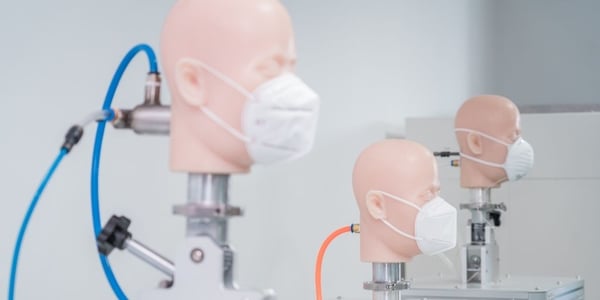 The demand for respiratory protection masks in Germany and Europe is growing rapidly. An end to this trend is not in sight due to the current development concerning the Corona pandemic. Against this backdrop, the globally active testing service provider TÜV Rheinland has now certified respiratory protection masks of protection class FFP2 for the European market for the first time. The certificate was awarded to the German manufacturer EPG-Stolfig. The long-established company produces the respiratory protection masks at its plant in Eichelhardt, Germany. TÜV Rheinland's certification is based on the requirements of the authoritative Regulation 2016/425 for so-called Personal Protective Equipment (PPE).
The demand for respiratory protection masks in Germany and Europe is growing rapidly. An end to this trend is not in sight due to the current development concerning the Corona pandemic. Against this backdrop, the globally active testing service provider TÜV Rheinland has now certified respiratory protection masks of protection class FFP2 for the European market for the first time. The certificate was awarded to the German manufacturer EPG-Stolfig. The long-established company produces the respiratory protection masks at its plant in Eichelhardt, Germany. TÜV Rheinland's certification is based on the requirements of the authoritative Regulation 2016/425 for so-called Personal Protective Equipment (PPE).
Mr. Ralf Scheller, Member of the Executive Board of TÜV Rheinland AG: “Currently, the demand for respiratory protection masks is extremely high due to the Corona pandemic. These masks are designed to protect health. This makes it all the more important to focus on safety and quality when testing products. As an independent testing service provider, we want to help ensure that products are available that meet the requirements of standards and regulations as well as those of the market. That's why we will continue to invest in the testing of personal protective equipment.” Masks certified by TÜV Rheinland can be recognized by the “CE 1008” marking.
Reliable product quality is also a priority for the Stolfig Group, which produces the masks: “We are pleased to be able to continue improving reliability of supply in Europe by setting up a further regional production facility here in Germany. At the same time, it is important to us to ensure consistently high quality in production. This is precisely what we have achieved,” says Peter Stolfig, Managing Director of the Group.
Comprehensive testing in TÜV Rheinland laboratories
TÜV Rheinland experts carried out the testing of the new FFP2 masks in the company’s own specialized laboratories. As part of the required tests, the material, packaging, product labels and descriptions and, in particular, the filter medium permeability, breathing resistance and leakage of the masks are checked in detail.
The focus is on the effectiveness of the protection: Particle-filtering masks (Filtering Face Piece, FFP) are also referred to as FFP1, FFP2 or FFP3 masks, depending on the permeability of the filter. The filtering performance of the mask material is tested against the European standard DIN EN 149 for protection against particulate pollutants containing aerosols: FFP2 masks, as TÜV Rheinland has now certified, must filter at least 94 percent of the aerosols in the test. FFP masks are used for self-protection against droplets and aerosols. Unlike medical face masks, such masks are not considered medical devices, but personal protective equipment. Such products may only be certified by a notified body recognized by the European Union (EU). In this case, this is TÜV Rheinland InterCert for the EU.
Always look for CE marking
Thanks to its status as a notified body in TÜV Rheinland’s global network of laboratories, the independent testing service provider is an important point of contact for all companies that manufacture or distribute particle-filtering masks. In this context, TÜV Rheinland has specialized laboratories internationally for testing personal protective equipment. After successful certification, manufacturers can CE mark their products and place them on the European market as personal protective equipment. For certification by the experts of the international testing service provider, the products must comply with the requirements of the authoritative Personal Protective Equipment Regulation 2016/425.
With the CE mark, producers themselves declare that their product, in this case respirators, meets all EU legal requirements. A four-digit number indicating the respective testing organization – for example, “1008” in the case of TÜV Rheinland, follows the CE mark. Buyers should also make sure, among other things, that there is a manufacturer's label on the packaging or product. The masks must also have an expiration date. This date indicates the minimum period of time for which the filter performance is ensured when used properly. Finally, the instructions for use must be followed exactly so that the mask can develop its protective effect in an optimal way.


